2020 Visionaries: Predictions For The Digital Workplace
The digital workplace of the future is right around the corner and many enterprise tech leaders are probably wondering:
How can I be prepared for the changes that lie ahead?
Luckily, we’ve gathered together some of the brightest minds in the game to deliver their predictions. These experts range from technology leaders and analysts that have devoted their careers to pushing the limits of the digital workplace.
The integration of HR and IT
–Pedro Bados (Founder and CEO, Nexthink)
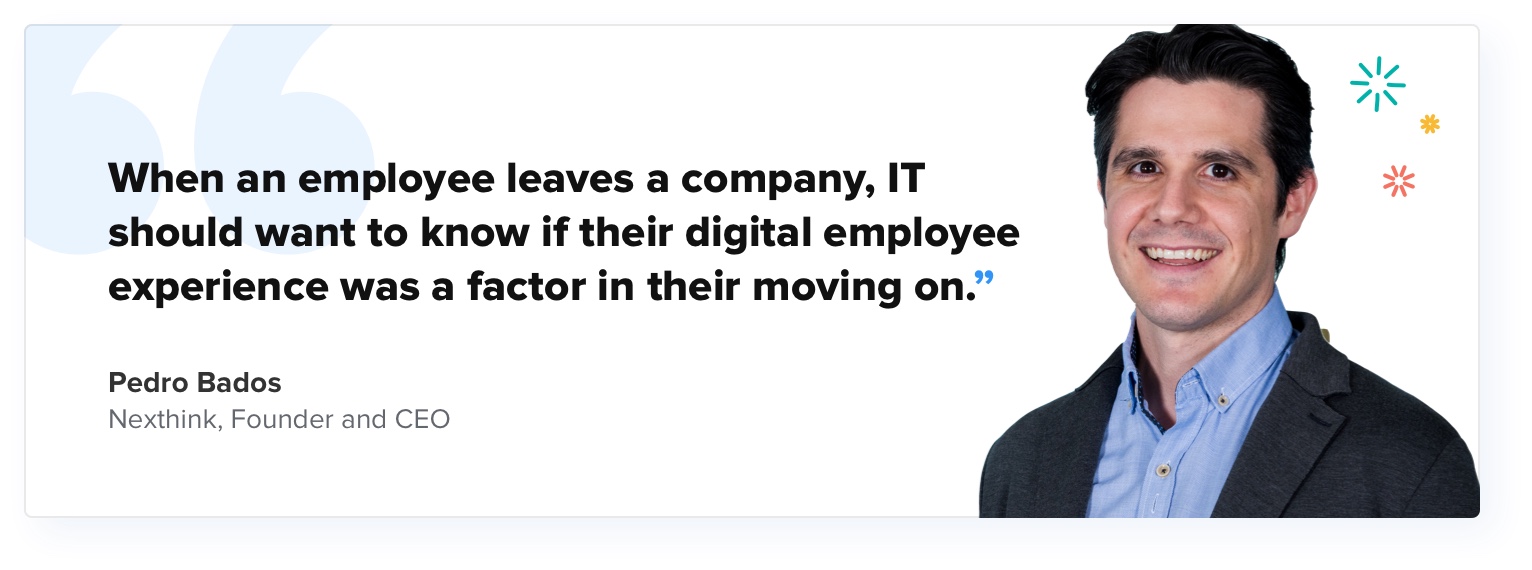
We know that levels of frustration around Digital Employee Experience (DEX) have already passed a tipping point: across the last year or two, it’s become widely established that poor IT is a main factor impeding productivity and driving attrition. In 2020, we expect to see some new effects of this awareness. One of these will be IT’s inclusion in more conversations and processes than ever before.
For instance, we’ve started hearing about CIOs participating in employee exit interviews. It makes sense. When an employee leaves a company, IT should want to know the extent to which digital experience was a factor in someone deciding to move on. At the very least, IT should embrace the opportunity to get full and frank feedback on that digital experience from the outgoing colleague.
It all points to an ever-expanding dialogue between IT and HR. And as the walls between these previously discreet and distinct silos begin to crumble, we will see reporting lines and team structures start to change. In some instances, this will mean HR reporting into CIOs, or vice versa – or both reporting directly to the COO or CEO. In others, we will see teams emerge focused specifically on all aspects of employee experience and encompassing both IT and HR specialists.
Expansion to the deskless workforce
–Andrew Hewitt (Analyst, Forrester)
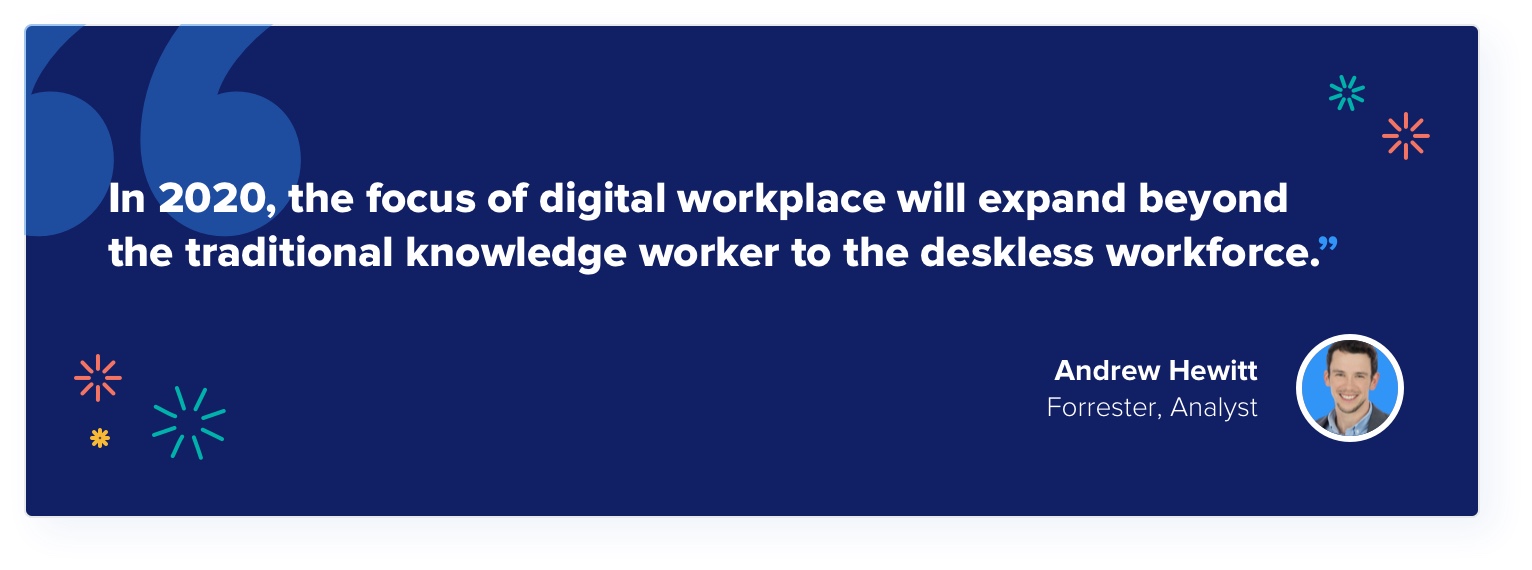
In 2020, the focus of digital workplace will expand beyond the traditional knowledge worker to the deskless workforce. This will include both customer-facing and non-customer facing roles in industries such as retail, manufacturing, healthcare, and hospitality. Companies will increasingly realize that creating engaging digital experiences for these groups is critical to unlocking higher retention in these attrition-prone industries.
Forrester sees investment coming from multiple avenues, but they mostly center around providing better communications and collaboration tools for employees, enhancing access to customer information, and automating key mobile workflows to enable higher productivity while on the go.
While companies will likely eventually look at measuring the experience of these workers, phase one will be focused primarily on tech enablement, with EX measurement maturation to follow in the coming years.
The ‘Experience Generation’ comes of age
-Yassine Zaied (Chief Strategy Officer, Nexthink)
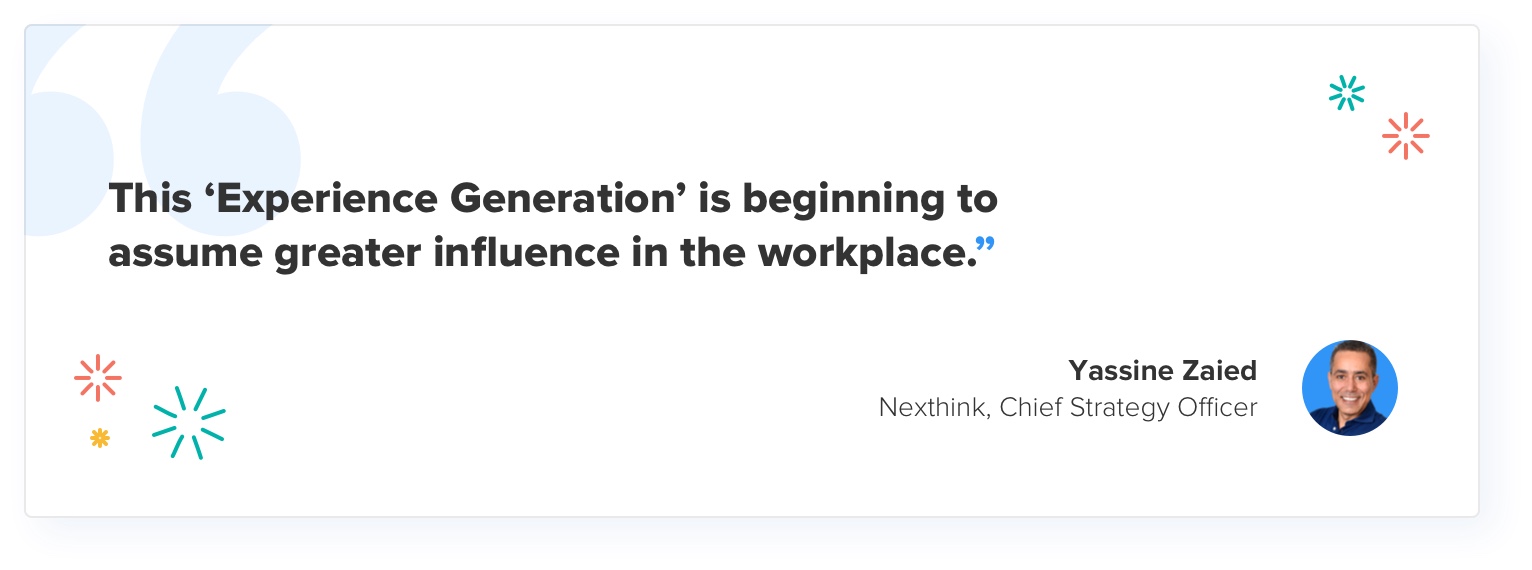
A whole generation has grown up thinking of everything – from movies to restaurants to cab rides – in terms of the ‘experience’ they provide, as well as being able to rank, rate and offer feedback on the quality of these experiences.
This ‘Experience Generation’ has been joining the workforce in droves for years. However, when it comes to its experience of IT in the workplace (or, digital employee experience), its expectations remain rarely met, its feedback almost never sought, and they have by and large – as the most junior part of that workforce – been expected to accept this as the way things are, even when this has been at the expense of its own productivity and standards.
In 2020, we will start to see a significant qualitative shift: having got the first few years of their careers under their belts, this Experience Generation is beginning to assume greater influence, importance and seniority in the workplace.
One of the biggest impacts of this demographic shift will be on a growing intolerance for bad technological experiences at work, along with a will to influence them for the better. At best this will mean giving feedback here as they do in every other part of their lives. At worst it will mean them simply voting with their feet. Now is the time for organizations to start getting ready for what this means.
Digital Employee Experience gets real
–James McMahon (Head of Atos Digital Workplace, Atos)
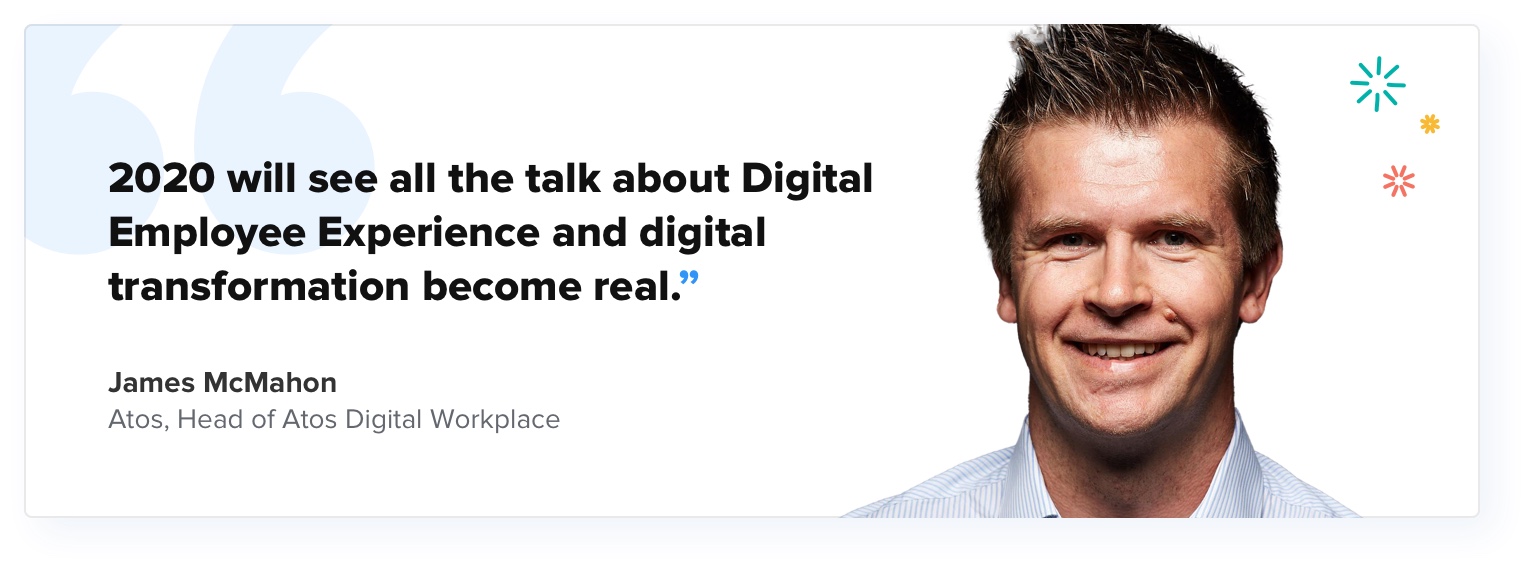
2019 could be characterised for many as a year spent repaying technical debt – going from Windows 7 to Windows 10 being one conspicuous example. By and large this has had a negative impact on progress.
2020 will see IT and businesses get the breathing space required to plan and implement future steps, rather than simply rush to get off the burning platform. This will mean a proper focus on modern workplace delivery, a focus on cloud managed workplace services, and greater implementation of XLAs. In other words, I think 2020 will see all the talk about Digital Employee Experience and digital transformation become real, with tangible changes both in terms of technologies and services.
In the midst of all this innovation, one of these emergent technologies will surprise us. Perhaps it will be intelligent automation, modern security management or workplace AI? Time will tell. But it’s going to be a year of innovation, without a doubt.
The birth of business-led technology investment
–Tim Flower (Director of Business Transformation, Nexthink)
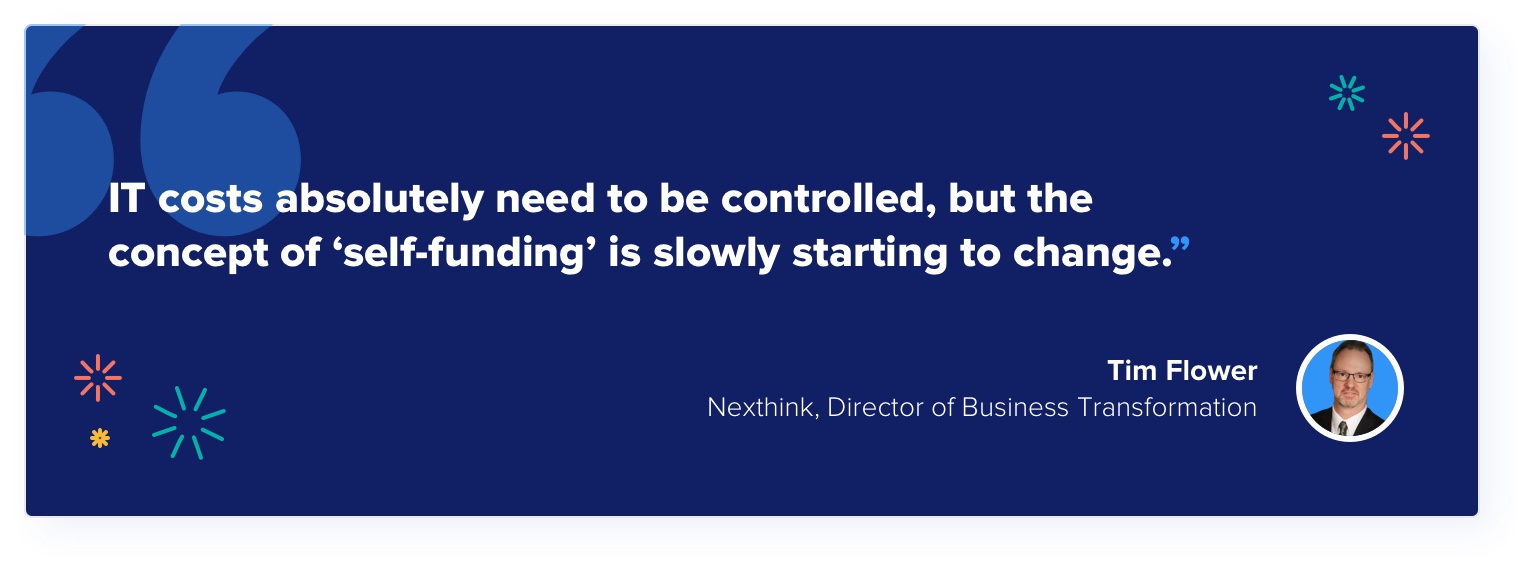
IT has spent decades focussed on provisioning new services, but up to now has lacked the ability to accurately assess adoption, consumption, and sentiment from its own business users. This has meant that IT has had no meaningful way to calculate the true impact, positive or negative, of these new services.
2020 will see CIOs start to look at technology investments in a completely different way.
What is starting to shift is the concept of funding technology based on the benefit (or disruption) it brings to those very business users it is deployed to, rather than the benefit to the IT shop. IT costs absolutely need to be controlled, but the concept of “self-funding” – that is, of IT projects that need equal savings within the technology budget – is slowly starting to change as businesses begin at last to measure the real impact of new technologies on users, and on their productivity.
Take for instance a large 150,000 audit and consulting firm in the US who recently made a business case based on the anticipated outcomes of improving the End-user Experience. In the end, the global CIOs agreed that the initiative deserved to be funded because it was good for business, not because it was good for IT. We expect this to become a significant new trend in both the next year and the next decade.
Proactive IT will arrive at our workplace
-Andre Spölming (IT Lead, IT Service Desk, Apetito)
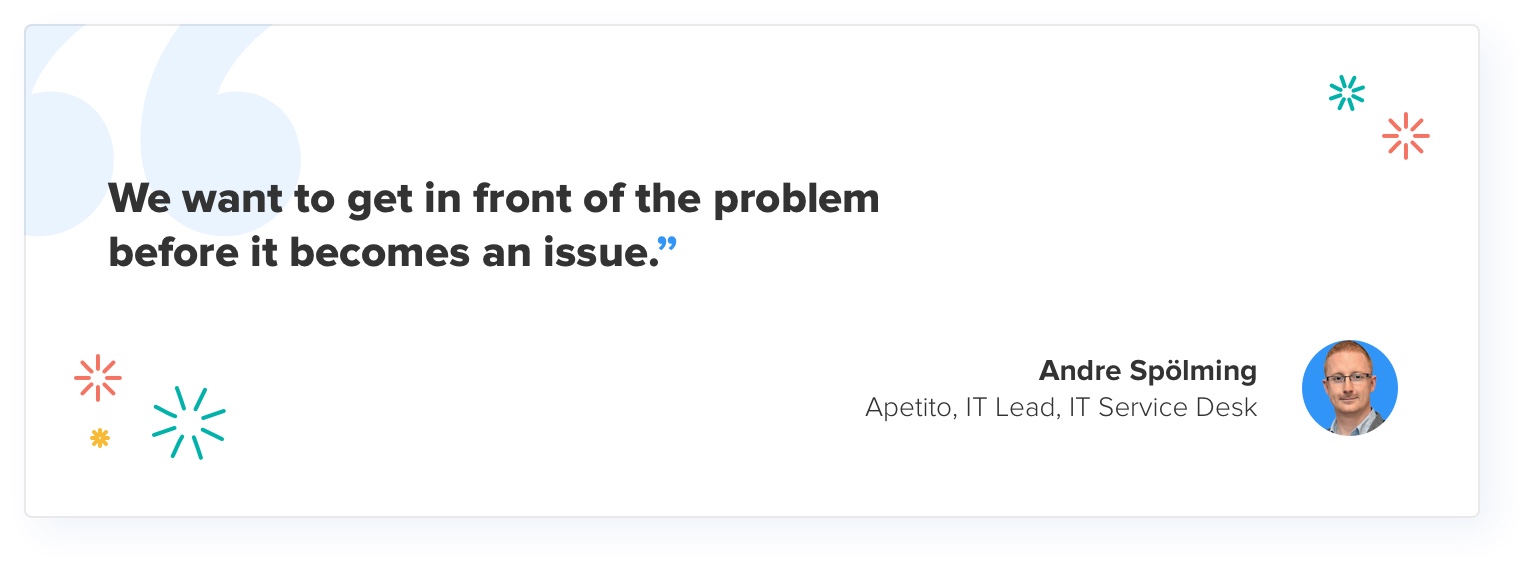
At Apetito we support around 3,500 devices across the global market. Years ago, we were very much in a firefighting mode, reacting to incidents and problems on a day-by-day basis. Our first focus was on stabilising the infrastructure. Then we started planning the next step in improving our end-users’ experience: we sought an endpoint management system and that’s what brought us to Nexthink first of all.
We’ve had some great successes with Nexthink over the last four years, but with their help, in 2020 we are going properly proactive as a service desk. It’s a different mindset for IT. We have to stop thinking in terms of ‘when we get a problem, we’ll get a call, and we respond to it then.’ We have to start thinking in terms of proactively calling the user: because we know they’ve been experiencing difficulties ourselves already (without being told), or better yet because we’re concerned that they’ll start experiencing difficulties unless we act.
We want to get in front of the problem, so we can solve it before it becomes an issue for the user. Nexthink brings us the transparency required to make this possible.
The conversation revolution
–Alan Nance, Co-Founder and Managing Partner, CitrusCollab
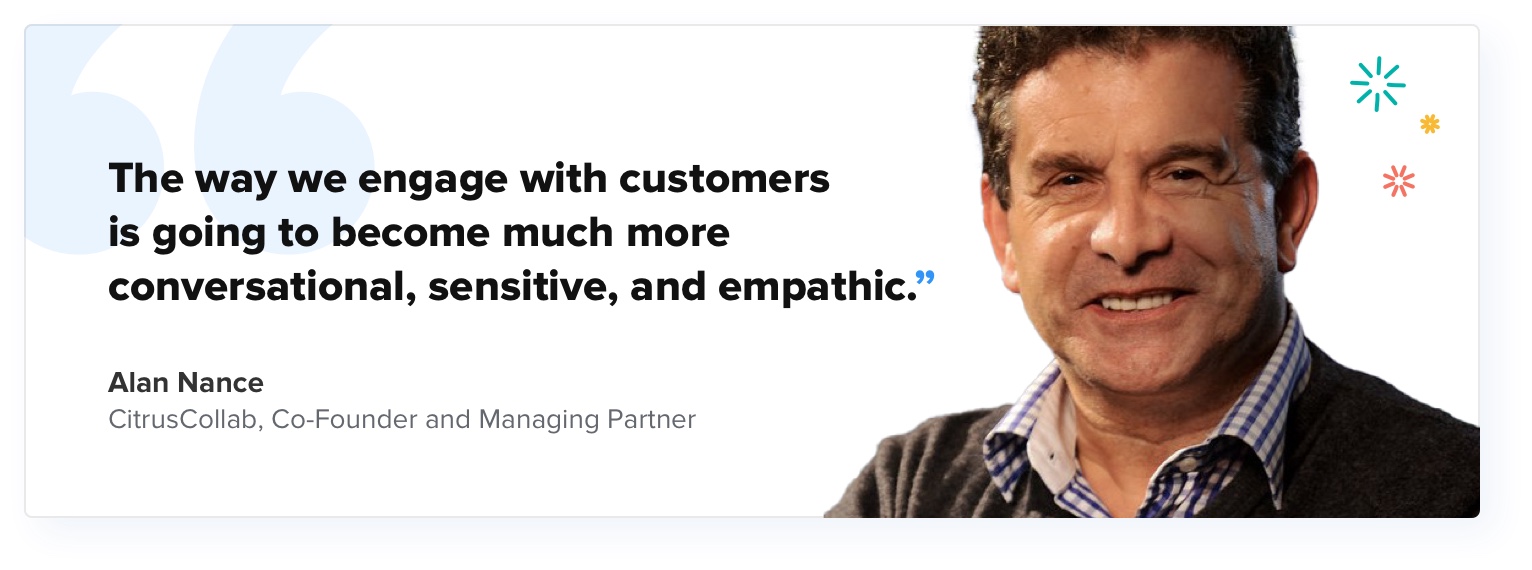
The way we engage with customers is going to become much more conversational, sensitive, and empathetic. This trend is across all sectors and cultures. It is a surprising result of our increasing ability to tellingly predict and anticipate customer behavior. Think of a call-center. Today these are primarily inbound services: people call them for information about products and services or to complain about them. Less than 5% of calls are outbound. As we gain more insight into customer experience and become better at anticipating an opportunity or a difficulty, call centers will inevitably become more proactively engaged with the outside world. We expect outbound calls to be closer to 50% of all calls in the years ahead.
This change in perspective will inspire a cultural and skill set shift in the call agent community. Rather than being incentivized to process inbound callers quickly, they will increasingly conduct valuable outbound conversations with (prospective) customers. The agents will need to be as interested in customer experience (and as much a part of it overall) as in the technology driving the outreach. In this way, call centers will become conversation centers.
Of course, you see the same principle with Nexthink’s impact on the way service desks function. Nexthink puts IT in the position to do the same thing: anticipate problems, reach out to their business customers, intercede, and make a difference. Across multiple sectors, the ability to engage with, listen to, understand, and build relationships with customers and colleagues is going to be crucial. In this way, service-desks will increasingly become experience desks.
Is your IT team ready for 2020?
One thing is certain: 2020 is going to be a monumental year for digital workplace technologies.
If you want to stay ahead of the digital changes and challenges that await, you need an IT solutions platform that can help you deliver the ultimate Digital Employee Experience. The Nexthink platform enables IT departments to predict problems before they happen and effect meaningful change at scale.
If you are interested in learning more, talk to a Nexthinker today.
Related posts:
- The Ultimate List of Digital Employee Experience Job Titles
- The DEX Show | Podcast #7 – A Human Approach to the Future of Work w/ Paul Hardy
- The DEX Show | Podcast #1 – Holistic Technology Experience Management w/ Andrew Hewitt
- Digital Workplace Predictions for 2019